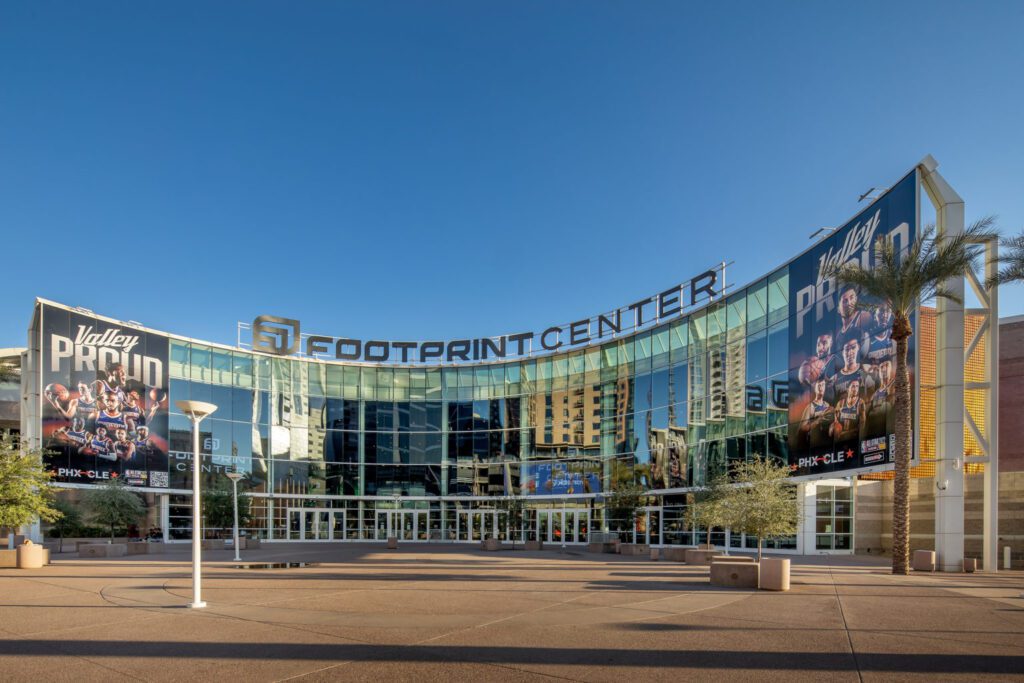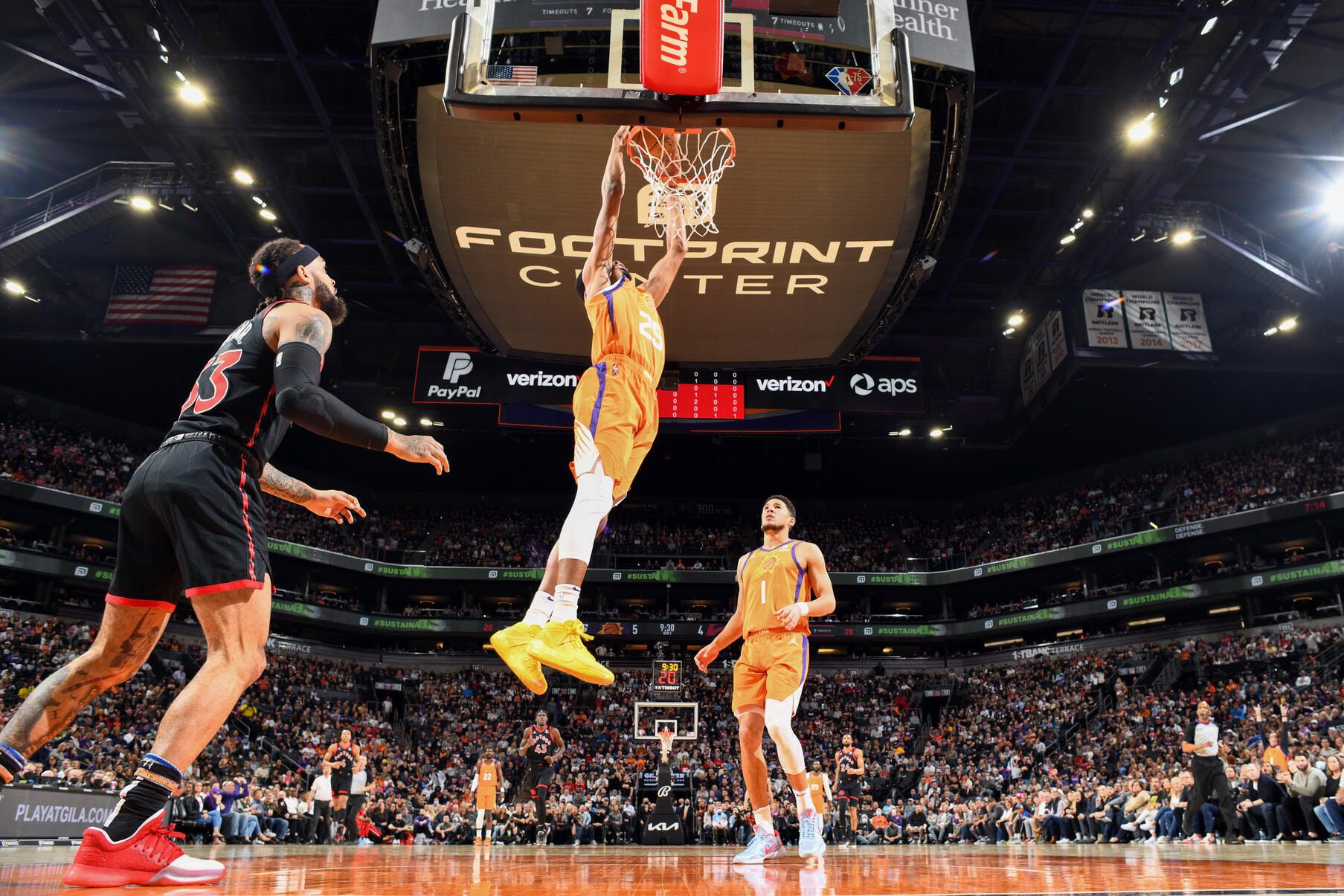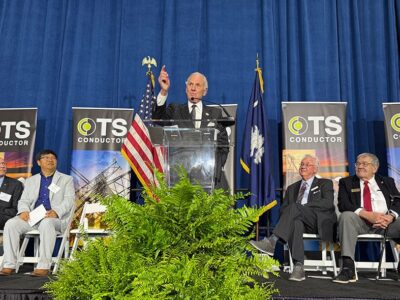The Phoenix Suns have seen their fortunes on the rise since 2020 – when it comes to both basketball and sustainability. On the court, no NBA team has won more games than the Suns have during the 2020-21 and 2021-22 seasons. The Suns’ ownership (which also operates the WNBA’s Phoenix Mercury and the Spanish pro soccer team Real Mallorca) made news on the environmental front in July 2021 by entering into an innovative association with Footprint – well known for its cutting-edge work in the green material science field. While Footprint’s forward-looking work was significant to the Suns, it was also crucial that Footprint is based in the Phoenix area and shares the team’s commitment to the region.
In the words of Suns & Mercury, chief revenue officer Dan Costello “will position (Phoenix) at the forefront of the sustainability movement.”

The deal resulted in the re-naming of the arena to the Footprint Center. The eco-tech company also introduced its plant-based alternatives for single-use plastic items (such as plates, bowls, straws, utensils, and packaging) into the facility’s operations. Additionally, composting bins, along with educational signage, have been placed next to the trash cans and recycling containers in the arena. In contrast, the Suns’ team store has reusable drinking bottles and sustainable clothes for sale. “Integrating Footprint’s plant-based fiber technology into our core business functions will mobilize partners and fans to drive collective and systemic change in our arena and beyond,” stated Suns/Mercury/Real Mallorca owner Robert Sarver.
Footprint co-founder and CEO Yoke Chung similarly has expressed how “we’re proud to be part of paving the way to a healthier planet at Footprint Center.” The company’s ambitious goal is to make the Footprint Center carbon-neutral while also inspiring the public and other sports venues to follow in their footsteps. During games, the Center’s giant LED scoreboard presents messages about sustainability issues and encourages people to pledge to cut down on using plastics. Players and entertainers performing at the arena will be asked to participate too in Pledge2050, which the Footprint Foundation launched to inspire the public to say no to single-use plastics.
Besides raising people’s environmental awareness, Footprint envisions the arena as a “living innovation lab that will engage experts, scientists, and corporations as well as Suns fans for input on green ideas and solutions.
This venue-as-lab concept will be a place for consumer feedback, new opportunities for our customers,” asserts Footprint CEO Troy Swope. “We can educate fans in a way that will create a ripple effect outside the arena.”
Founded in 2014, Footprint conceives and creates plant-based products that match plastics’ performance and price, biodegradable, compostable, and recyclables. So far, the company’s products have removed over 61 million pounds of plastic waste from our environment. A member of the World Economic Forum’s Global Innovators Community, Footprint made Fortune Magazine’s “Change the World” list in 2021 and was one of CNBC’s Disruptor 50 companies in 2021. Since its new partner owns teams in Phoenix and in Spain, Footprint has expanded its ability to make an impact worldwide.
The team has long been concerned with protecting the environment. It was one of the first NBA franchises to invest in solar power, a natural interest since Phoenix, known as the “Valley of the Sun,” ranks as the major American city with the sunniest days on average.
In 2012, 966 solar panels were installed on the arena’s parking garage. Covering 17,000 square feet, these panels annually generated 378,000 kilowatt-hours, creating enough clean electricity to power 20 Suns’ home games, eliminating over 440,000 pounds of carbon dioxide (CO2) each year.

The naming of the Footprint Center occurred shortly after the completion of a multi-year arena renovation. This project involved more than 8,000 tons of material not going to landfills as well as 757 tons of plastic and metal getting recycled. The variety of eco-related upgrades
included low-flow fixtures and new plumbing systems that lowered water consumption by over a million gallons each year. Meanwhile, annual electrical energy usage was cut by 5.5 million kWh through the addition of high-efficiency mechanical systems, LED lighting, and air conditioning enhancements. These changes reduced 3,800 tons of carbon emissions – or about 4,700 acres of forest in carbon sequestration – every year. The air quality of the arena is better now, due to the HVAC economizers that deliver more fresh air.
Footprint views its work at the Footprint Center as part of its overall mission to create a more sustainable world. While it isn’t looking for other naming rights situations, the company is eager to work with other sports franchises moving forward.
“The sports industry is going to start seeing that there is this movement around sustainability and what it means to be a part of it,” Footprint chief marketing officer Susan Koehler told CNBC. “I think all stadiums are going to see it as something they have to do.”





